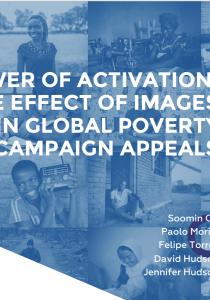
There is irony in the government’s decision this week to return DFID to the FCO: With little to no apparent research, consultation or explanation, it is disrupting the work of a department famed for its research and evidence-led approach to delivering aid.
The British public do not support merging DFID with FCO. According to surveys conducted in March 2020 by the Development Engagement Lab and YouGov, 33 percent of the British public prefer to retain DFID’s independence from the FCO, compared with only 19 percent who voted to merge the two departments. Throughout the years, research by DEL has also demonstrated the public’s desire to spend aid on those who need it the most, rather than in national, political or commercial interests, which is FCO’s primary wheelhouse.
The challenge will be to ensure that poverty reduction remains at the heart of Britain’s aid programme.
Let’s dig into those figures. It’s important to point out that in the same survey, (reflected in the title figure) 32% of respondents said they ‘don’t know’ whether FCO and DFID should be merged. 16% said they hold ‘no strong opinion.’ This means 48% either don’t know or don’t care much about a merger, compared with 33% who feel DFID should remain independent, and 16% who say it should be merged.
From the numbers of those who don’t know or care about a merger, it’s clear there is little appetite for it. What’s exceptional here is that there is little opposition, too. This is because people care less for institutions (NHS excepted) than they do how aid is used. This is the real issue. What will happen to UK aid without the ethos, standards, transparency and oversight that DFID has honed and implemented in its two decades of independence from the FCO? The House of Commons’ International Development Committee is already facing closure. Given the FCO’s poor record on aid spending, these are not good signs for the transparency and accountability of future aid.
There’s also a case to be made in the current media climate that a government department that has managed to attract so little of the public’s interest is probably doing something right.
The great risk of the FCO and DFID merger is that, in line with recent years, the aid budget will continue to move toward supporting middle income countries and servicing UK trade and commercial interests, instead of the world’s poorest. The British public favour giving aid to help meet the needs of the world’s poorest and where it serves mutual interest (e.g. fighting global diseases). There is little evidence to suggest that the public favour using aid for purely UK national interests.
Since DFID’s founding as an independent government agency in 1997, it has earned a global reputation for transparency, effectiveness and value for money, according to the government’s own independent watchdog, the Independent Commission for Aid Impact, as well as Publish What You Fund’s Aid Transparency Index. By contrast, the FCO, the UK government’s historic diplomatic and political service overseas, has routinely earned poor, or “red” and “amber” ratings for its aid spending by the same watchdog, which highlights a lack of transparency and value for money.
By allowing FCO to subsume DFID, the government is not only defying the interests of the British public, it is putting UK taxpayer pounds at risk of political, diplomatic and business interests, which are notoriously counterproductive in decreasing global poverty, improving opportunities for women and girls and supporting the world’s fight against diseases and pandemics, among others.
There is a double risk. The poverty alleviation focus and effectiveness of UK aid is damaged, and it could undermine support amongst the public. Our data suggest that only 1 in 5 members of the public want to see DFID brought into the FCO. That said, one third say that they ‘don’t know,’ which is a much higher proportion than usually say don’t know, suggesting this is quite an esoteric issue for most people. But, what people do care about is transparency and making sure that development aid is given based on the needs of the world’s poorest people and not in the national interest. This is true even for Conservative party identifiers – less than 2 in 10 favour giving aid to promote UK national interests. The challenge therefore will be to ensure that poverty reduction remains at the heart of Britain’s aid programme and for the FCO to raise its ‘poor’ rating to DFID’s ‘very good’ rating in the Aid Transparency Index. Otherwise support for Global Britain could be damaged by this move.










































































